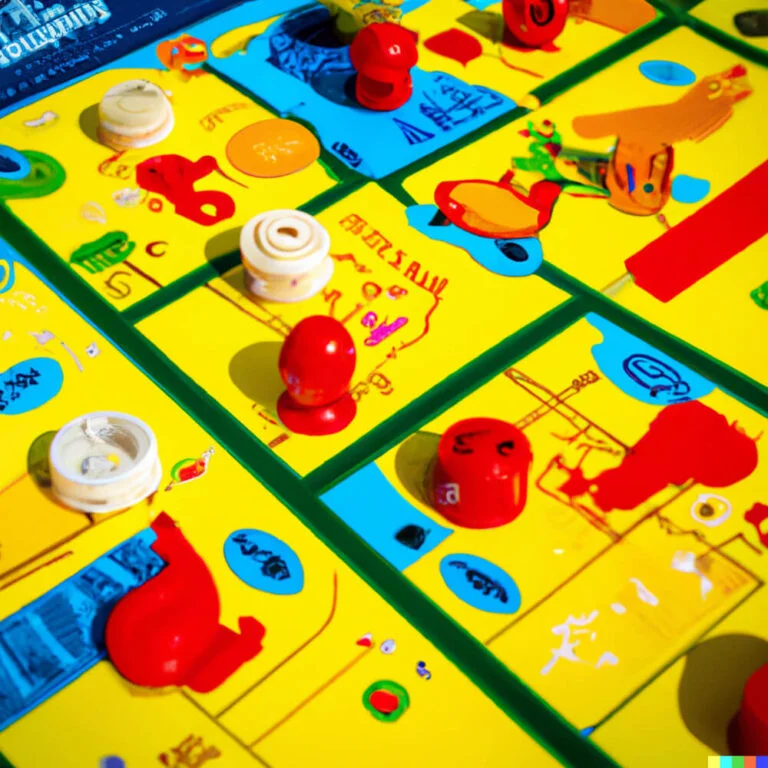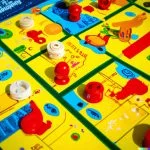Deeply rooted in history, Othello has captivated players for centuries with its strategic gameplay and dynamic board. In this introductory section, we delve into the rich origins and enduring popularity of this classic board game. Uncover the fascinating backstory of Othello, tracing its roots to ancient variations and exploring its historical significance.
The origins of Othello can be traced back to several ancient board game variations played across different cultures. From the Egyptian game of Senet to the Chinese game of Go, these early predecessors laid the foundation for Othello’s gameplay mechanics. Throughout history, Othello has been known by many names, including Reversi and Yang Boa Qi. Despite its various aliases, Othello remains beloved worldwide for its engaging gameplay and challenging strategy.
Today, Othello continues to transcend boundaries and capture the imagination of enthusiasts globally. The enduring popularity of this classic board game can be attributed to its intuitive rules and strategic depth. In this article, we aim to provide a comprehensive understanding of Othello’s mechanics, from setup to winning strategies. By mastering the art of flipping and unraveling core strategies, players can gain control over the board and outmaneuver their opponents.
As we embark on this journey through the world of Othello, prepare yourself for an immersive experience that combines tactical thinking with sheer excitement. From tournaments that test your mental acuity to modern adaptations that make the game accessible to all, there is something for everyone in the realm of Othello.
Join us as we unlock the secrets behind this timeless classic and explore how it continues to shape our cognitive development and foster a vibrant community united by their love for intelligent gameplay.
Unveiling the Game Mechanics
Othello, also known as Reversi, is a classic board game that has captured the hearts of players for generations. In this section, we will delve into the rules and objectives of Othello, providing a step-by-step breakdown of how to play this captivating game.
To begin playing Othello, you will need a square board with eight rows and eight columns. The game pieces consist of circular discs, typically black on one side and white on the other. Each player starts with two discs placed diagonally in the center of the board: one black disc and one white disc.
The main objective in Othello is to have more of your own color discs on the board than your opponent’s by the end of the game. This sounds simple enough, but what makes Othello intriguing are its unique mechanics.
The turn-taking mechanism in Othello adds an element of strategy to gameplay. On their turn, players must place a disc on an empty square on the board such that it surrounds at least one opposing disc horizontally, vertically, or diagonally. When a player successfully places their disc in such a manner, all discs enclosed between their newly placed disk and any other discs of their own color are flipped to become their color.
Strategic thinking plays a crucial role in Othello. Players must carefully consider each move’s potential consequences-how it may affect future moves and influence control over different regions of the board. Keeping track of these nuances is essential for success in Othello.
Understanding these fundamental rules and mechanics sets players up for mastering the artful strategies employed within this classic game. It enables them to tap into its complexities-unraveling layers upon layers while navigating through each move-and paves the path towards becoming an Othello champion.
Key Features
- A square board with eight rows and eight columns
- Circular discs in black and white
- Turn-taking mechanism
- Flipping discs to gain control
- Strategic thinking and planning
Whether you are new to Othello or a seasoned player looking to refine your skills, understanding the rules and mechanics of the game is essential. In the next section, we will explore the art of flipping and examine the key strategies that can help you dominate your opponents on the Othello board.
Mastering the Art of Flipping
In Othello, flipping, also known as a flipping strategy, is a crucial aspect of gameplay that determines the outcome of each move. Flipping involves strategically placing a disk on the board to surround and “trap” your opponent’s disks between your own. By doing this, you can flip those trapped disks to your own color, effectively adding them to your score.
There are several key techniques and tactics that players can employ to master the art of flipping in Othello. One popular technique is called “corner capture” or “corner occupancy.” The corners of the board are highly valuable positions because they cannot be flipped by an opponent’s move. By securing the corners early on in the game, players can gain a strategic advantage and control over key areas of the board.
Another important tactic is maintaining mobility and flexibility on the board. Othello is a dynamic game where strategies constantly evolve with each move. Players must be adaptable and ready to adjust their plans based on their opponent’s moves. By maintaining mobility, players can position their disks strategically to create opportunities for flipping multiple disks at once.
Edge control is another effective strategy in Othello. By placing disks along the edges of the board, players can limit their opponent’s options for movement and potential flipping opportunities. This tactic not only helps secure territory but also puts pressure on opponents to make less favorable moves.
To master flipping strategy in Othello, it is vital for players to analyze potential flips before making each move. This requires careful calculation and foresight into how each placement will affect future moves and control over different areas of the board.
By understanding these key techniques and tactics associated with flipping strategy in Othello, players can enhance their gameplay skills and increase their chances of dominating opponents. With practice and strategic thinking, mastering this core strategy can pave the way to victory in this classic board game.
Strategic Insights
Othello is a game of strategy and skill, with players constantly adapting their tactics to outmaneuver and conquer their opponents. While basic knowledge of the game mechanics is essential, mastering core strategies is what separates casual players from seasoned veterans. In this section, we will delve into the key strategies that can help you gain an edge in Othello.
One of the fundamental strategies in Othello is corner occupancy. Controlling the corners of the board provides a significant advantage as it restricts your opponent’s options and allows you to secure stable positions. By occupying corners early on, you can establish a strong foothold and limit your opponent’s opportunities for expansion.
Another crucial strategy in Othello is mobility. Maintaining mobility means having pieces in strategic positions across the board that allow you to quickly react and adapt to changing situations. This flexibility enables you to seize control of new territories and snatch away your opponent’s pieces.
Edge control is yet another vital aspect of successful gameplay. The edges of the board provide unique opportunities for flanking maneuvers and counterattacks. Keeping an eye on these edges allows you to influence the flow of the game by limiting your opponent’s options and preserving your own.
Recognizing potential threats and understanding when to defend or sacrifice certain pieces is also an essential strategic skill in Othello. By evaluating each move with foresight, players can anticipate their opponent’s next move, block their plans, and unleash devastating counterattacks.
In summary, mastering core strategies in Othello involves honing skills such as corner occupancy, maintaining mobility, edge control, and anticipating moves through careful evaluation. Learning from experienced players, studying openings and endgame techniques, and practicing through gameplay are effective ways to improve strategic thinking in Othello.
| Core Strategy | Description |
|---|---|
| Corner Occupancy | Controlling the corners to establish a strong position and limit opponent’s options. |
| Mobility | Having pieces strategically positioned for quick adaptation and control of new territories. |
| Edge Control | Influencing the flow of the game through strategic positioning along the edges of the board. |
| Anticipating Moves | Evaluating each move with foresight to recognize threats and plan effective counterattacks. |
Immersive Gameplay
Othello tournaments offer an incredibly immersive and thrilling experience for players and spectators alike. These tournaments showcase the intense mental acuity, strategic planning, and competitive spirit that define the world of Othello gameplay. As players compete against each other in high-stakes matches, they must carefully consider their moves, anticipate their opponents’ strategies, and adapt their gameplay accordingly.
One of the most captivating aspects of Othello tournaments is the level of mental acuity required to succeed. Players must possess strong analytical thinking skills to assess the board state accurately and identify potential threats or opportunities. Additionally, strategic planning is crucial as they navigate through the game, making decisions that will set them up for future success. The challenging nature of Othello tournaments ensures that players are constantly pushing themselves to think several steps ahead and outmaneuver their opponents.
These tournaments also highlight the exhilaration that comes with every move made on the board. Each strategic flip or capture can completely alter the course of a match, creating suspenseful moments filled with anticipation. Spectators are often on the edge of their seats as they witness players engage in intense battles of wits, eagerly waiting to see who will emerge victorious.
| Tournament | Location | Description |
|---|---|---|
| World Othello Championship | Various locations worldwide | The most prestigious international tournament showcasing elite players from around the globe. |
| US Othello Open | United States | A popular tournament in the United States, attracting players of all skill levels. |
| National Othello Championship | Various countries | Each country holds its national championship, allowing players to represent their nation on a global stage. |
These tournaments not only test players’ skills but also foster a spirit of sportsmanship and camaraderie within the Othello community. Players have the opportunity to meet and interact with fellow enthusiasts from different backgrounds, forging friendships and connections that extend beyond the game.
Expanding Horizons
Introduction to Othello Variations: A Modern Twist on a Classic
As with many classic board games, Othello has undergone various adaptations and variations throughout the years. These modern twists have breathed new life into the game, attracting a wider audience and expanding its reach beyond traditional tabletop gameplay. In this section, we will delve into some of the most popular Othello variations and adaptations, showcasing the exciting ways in which the beloved classic has been reimagined.
Digital Versions and Mobile Apps: Othello On-the-Go
In today’s digital age, it comes as no surprise that Othello has made its way onto smartphones and tablets. Numerous mobile apps offer digital versions of the game, allowing players to enjoy Othello anytime, anywhere. These adaptations often come with interactive features, tutorials for beginners, and different difficulty levels to cater to players of all skill levels.
Additionally, digital versions of Othello frequently incorporate online multiplayer modes, enabling players to compete against opponents from around the world. This brings an exciting competitive element to the game, providing opportunities for players to test their skills against a diverse range of opponents.
Online Platforms and Communities: Connecting Players Globally
Beyond mobile apps, there are dedicated online platforms specifically designed for Othello enthusiasts. These platforms serve as virtual meeting places for players to connect, participate in tournaments or leagues, and engage in discourse about strategy and gameplay.
These online communities offer valuable resources such as tutorials, strategy guides written by experienced players, and forums for discussing tips and techniques. They provide an avenue for individuals passionate about Othello to learn from one another, share their experiences, and foster camaraderie within a global community.
Inclusive Adaptations: Making Othello Accessible to All
One of the notable aspects of modern adaptations is their efforts to make Othello more inclusive and accessible. Developers have recognized the importance of accommodating individuals with visual impairments by creating adaptations that are fully compatible with screen readers or providing tactile versions of the game with distinguishable pieces.
Similarly, some adaptations have incorporated customizable features and adjustable difficulty levels, allowing players to tailor the gameplay experience according to their preferences. These adaptations make Othello an enjoyable game for individuals of all ages, backgrounds, and abilities.
Rediscovering Othello
The Cognitive Benefits of Othello
Playing Othello is not only a source of entertainment but also a way to enhance cognitive development and mental stimulation. The game requires strategic thinking, problem-solving skills, and analytical thinking, making it an excellent exercise for the brain. Research has shown that regular gameplay can have several positive effects on mental acuity, memory, concentration, and overall cognitive functions.
One notable cognitive benefit of playing Othello is enhanced analytical thinking. As players navigate through different scenarios on the board, they are constantly analyzing their opponent’s moves and predicting their next move. This process fosters critical thinking skills and trains the brain to think strategically. By evaluating all possible outcomes and adapting their strategies accordingly, players develop the ability to make informed decisions under pressure – a valuable skill that translates into various aspects of life.
Improving Strategic Planning and Problem-Solving Skills
Othello is a game that demands careful strategic planning and problem-solving abilities. Players must anticipate their opponent’s moves while strategically positioning their own discs to gain control over the board. This gameplay requires foresight, adaptability, and the ability to devise effective strategies on the spot.
As players aim to dominate the board by flipping discs in their favor, they encounter complex scenarios that require creative problem-solving skills. They must evaluate multiple possibilities and choose the most advantageous option based on future projections. This process enhances critical thinking abilities and encourages players to approach challenges with a methodical mindset.
Furthermore, Othello promotes spatial awareness as players evaluate board positions from different perspectives. By recognizing patterns, identifying potential threats or opportunities across the board becomes easier. Over time, this spatial reasoning skill becomes more refined and can extend beyond the game into everyday life situations.
Supporting Studies on Mental Acuity
Numerous studies have been conducted to examine the effects of playing Othello on mental acuity. One such study published in the Journal of Cognitive Enhancement found that playing Othello regularly can lead to improvements in memory, attention span, and problem-solving abilities. Participants who played the game consistently over a period of several months demonstrated enhanced cognitive performance compared to those who did not engage in the game.
Another study published in the Journal of Experimental Psychology: Applied explored the impact of Othello on cognitive flexibility and context processing abilities. The researchers found that individuals who regularly played Othello exhibited greater cognitive flexibility and were better at multitasking compared to non-players. These findings support the notion that engaging with complex board games like Othello can have significant cognitive benefits.
Overall, rediscovering Othello as a means of cognitive development and mental stimulation can be immensely rewarding. By engaging in gameplay, individuals have the opportunity to sharpen their critical thinking skills, problem-solving abilities, and strategic planning capacities while enjoying an intellectually stimulating pastime.
Embracing the Othello Community
The Othello board game has not only captured the hearts and minds of players for generations, but it has also fostered a vibrant and passionate community. For those who want to delve deeper into the world of Othello, there are numerous resources, clubs, and events available to connect with fellow enthusiasts and enhance their gameplay experience.
One valuable resource for Othello players is online communities and forums dedicated to the game. These platforms provide a space for players to discuss strategies, share tips, and ask questions. Engaging with these communities allows individuals to learn from experienced players, gain insights into different playing styles, and stay updated on new developments in the game.
In addition to online communities, there are also Othello clubs that offer opportunities for players to meet in person and participate in friendly matches or tournaments. These clubs often organize regular meetings and events where players can play against each other, exchange ideas, and build lasting friendships based on their shared passion for Othello. Joining a club not only enhances your gameplay skills but also provides a supportive network of fellow players.
For those who want to take their Othello experience to the next level, there are various Othello events held worldwide. From local tournaments to international championships, these events offer players the chance to compete against top-level opponents while immersing themselves in the excitement of high-stakes gameplay. Participating in such events can be both thrilling and rewarding, as it allows you to test your skills against some of the best players in the world.
Overall, embracing the Othello community is an excellent way to enhance your gameplay experience and connect with others who share your love for this classic board game. Whether through online communities or joining local clubs and participating in events, being part of this community opens doors to new strategies, friendships, and shared experiences that only further enrich the timeless appeal of Othello. So why not take advantage of these resources and dive deeper into the world of Othello today?
Conclusion
In conclusion, Othello continues to stand the test of time as a classic board game that has captured the hearts and minds of players for generations. From its rich history and origins to its intricate game mechanics and strategic depth, Othello offers a compelling experience that appeals to both casual gamers and competitive enthusiasts alike.
Throughout this article, we have uncovered the fascinating backstory and historical significance of Othello, tracing its roots back to ancient board game variations. We have also explored the complexities of the game, highlighting the dynamic nature of the board and various strategies that players can employ to gain an advantage over their opponents.
But Othello is not just about gameplay. It fosters a sense of community among players, whether through local clubs, online forums, or exciting tournaments. The thrill and mental acuity required in competitive play make for an exhilarating experience that brings people together. And with modern adaptations and digital versions making Othello more accessible than ever before, its popularity is sure to continue growing.
Furthermore, research has shown that playing Othello offers numerous cognitive benefits such as enhanced analytical thinking, strategic planning, and problem-solving skills. It stimulates mental acuity while promoting sportsmanship and camaraderie within the community.
As we wrap up this exploration into the world of Othello, we invite you to embrace this timeless classic reimagined. Delve into the captivating gameplay it offers, ignite your strategic sensibilities, and experience the thrill of flipping your way to victory. Whether you are seeking entertainment alone or connections within a vibrant community, Othello offers endless opportunities for enjoyment and personal growth. So why not join us on this remarkable journey as we keep the legacy of Othello alive?
Frequently Asked Questions
How do you play Othello Classic?
Othello Classic is a strategy board game that is played on an 8×8 grid with black and white discs, representing the two players. The game starts with four discs in the center of the board, two black and two white, placed diagonally from each other. The objective of the game is to have more of your own colored discs on the board than your opponent by the end of the game.
Players take turns placing their discs strategically to flip their opponent’s pieces and gain control over more spaces on the grid. It requires careful planning, anticipation of moves, and adaptability to changing board positions.
Is Othello harder than Chess?
Whether Othello is harder than Chess is subjective and can vary depending on individual perspectives. Both games require strategic thinking and planning to outmaneuver opponents. However, they have different complexities that set them apart.
Othello has fewer potential moves each turn compared to Chess, making it easier for players to analyze possibilities and plan ahead. On the other hand, Chess involves a broader range of possible piece movements and positional combinations, which can make it more intricate to master. Ultimately, it depends on personal preferences and experiences with strategy games.
Is Othello board game solved?
No, the Othello board game has not been completely solved yet. Although extensive research has been done on optimizing play strategies for Othello through computer simulations and artificial intelligence algorithms, there are still uncertainties in achieving a definitive solution for every possible move combination in the game.
The high number of potential positions and complex interactions between pieces make it challenging to fully solve the game using present computing power or analytical methods known so far. However, researchers continue to study different aspects of Othello gameplay with hopes of further advancing our understanding of optimal strategies within its ruleset.

I love playing all kinds of games – from classics like Monopoly to modern favourites like Ticket to Ride.
I created this blog as a way to share my love of board games with others, and provide information on the latest releases and news in the industry.





